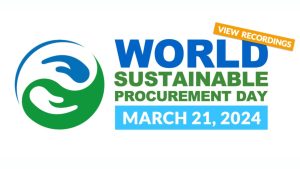Several factors are driving the transition to more sustainable procurement practices, as spelled out in Smart Procurement World’s 2021 Sustainability Report.
The 2030 Sustainable Development Agenda:
Designed by the United Nations General Assembly, the Sustainable Development Goals (SDGs) define 17 goals to be achieved by all countries by 2030 to secure a more sustainable future. The goals cover various socio-economic and environmental indicators to provide a holistic agenda for global sustainable development. Goal 12 speaks to the implementation of “sustainable consumption and production patterns” and not only highlights the importance of procurement in sustainable development, but is also viewed as a critical enabler to achieve most SDGs.
The changing reporting and regulatory landscape:
Both the King IV Report on Corporate Governance and the Global Reporting Initiative (GRI) 6 require organisations to address the social and environmental impacts that occur within their supply chains.
South Africa is unique in that it uses procurement as an enabler for socio-economic development through preferential procurement policies. These policies encourage South African organisations to develop and include small-scale suppliers within their value chains.
Further to this, the recently announced Waste Management Strategy by South Africa’s Department for Environment, Forestry and Fisheries, promotes circular economy and waste hierarchy principles to reduce waste to landfill. With the introduction of the extended Producer Responsibility Regulations (2020), which broaden the financial and physical responsibility of a product to the ‘producer’, procurement practitioners are now required to consider sourcing raw materials that enable reusability and recyclability.
Changing investor sentiment:
Increasingly institutional investors and shareholders are considering environmental and social factors when making investment decisions. Surveys such as the BlackRock 2020 Global Sustainable Investing Survey echo this reality with 86% of Europe, Middle East and African respondents stating that sustainability investment is, or will become, a key consideration for their investing strategies.
Cross-border legislation:
The UK Modern Slavery Act and California Transparency Act aim to eliminate slavery and human trafficking in product supply chains by enhancing supply chain transparency and reporting.
ILO estimates that there are 40.3 million people trapped in modern slavery, including 24.9 million in forced labour.10 https://www.ilo.org/global/topics/forced-labour/lang–en/index.htm
Addressing customer needs:
Customers are increasingly demanding that organisations ensure their products and value chains support environmental and social sustainability.
The proliferation of standards and industry initiatives:
There is an increase in sustainable procurement standards such as ISO20400 and industry initiatives such as the Sustainable Procurement Pledge, both of which provide guidance and support for organisations wishing to integrate sustainability within their procurement practice. These standards and initiatives are encouraging organisations to implement sustainable procurement practices.
Find out more at the Sustainability Summit Africa https://sustainafrica.co.za
The Sustainable Procurement Pledge (SPP) was founded in 2019 by the Chief Procurement Officers of Bayer International and Henkel, Thomas Udesen and Bertrand Conquéret, respectively. It was a call to action to embed more sustainable procurement practices by 2030. It is a voluntary initiative that offers procurement and supply chain practitioners a global platform to “pledge” their support and commitment to achieve more sustainable sourcing and buying practices. Individuals can sign up on the SPP website or LinkedIn to become SPP Ambassadors. This gives them a platform to show their commitment, engage other practitioners, share learnings, and build the capability to create awareness on the SPP within their organisation, sector and country.
Read more from the Sustainability Africa 2021 Summit Report Report Sustainability Report



























